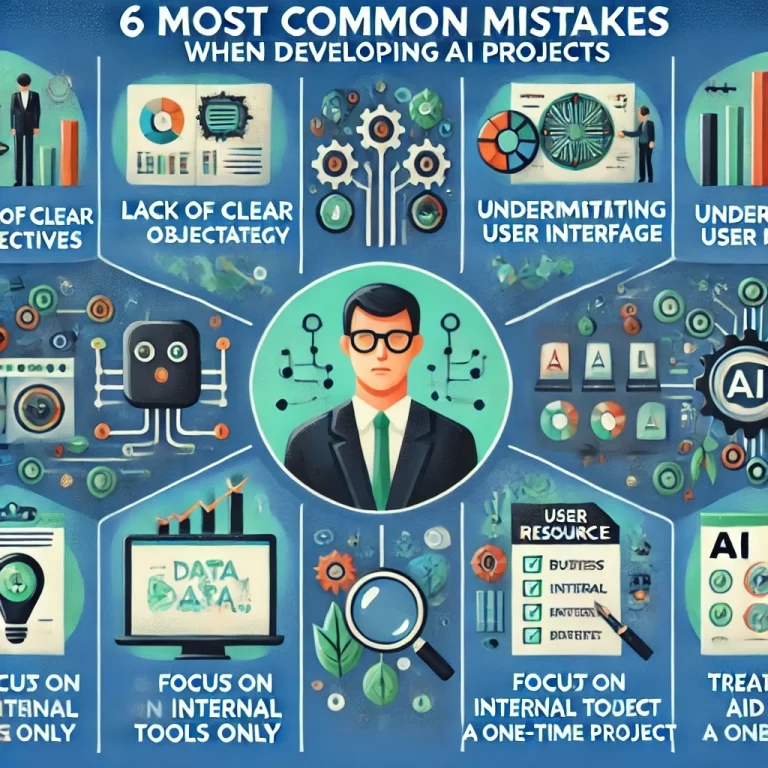6+ Disasters Companies May Do When Developing AI Projects
HAS AI BECOME ANOTHER RATE RACE?
Businesses are placing a growing importance, on AI initiatives to boost creativity and productivity levels steadily rising in significance over time.. Amidst this trend numerous companies stumble upon obstacles when putting these projects into action. A key misstep involves a lack of defined goals. It’s common for organizations to hastily embrace AI without a problem statement or strategy, in place resulting in solutions that don’t quite hit the mark and fail to meet business requirements. This lack of direction can squander resources. Fall short of delivering tangible benefits.
Another common problem that arises is handling of data quality issues in the context of intelligence systems training data sources. A crucial aspect that determines the effectiveness of such models, in making accurate predictions and generating reliable results. It is evident that numerous companies overlook the importance of maintaining meticulously curated datasets with a variety of data points and ensuring their cleanliness for optimal AI performance. Moreover—a point often overlooked—some enterprises regard AI implementation as a finite project rather than an ongoing process with potential, for continual improvement and refinement. AI systems need updates and testing to remain useful and, up, to date as technology advances. It’s essential to have a thought out strategy allocate resources wisely. Have a clear long term vision to prevent errors and maximize the benefits of AI for continuous progress.

Common Mistakes Companies Make in AI Projects
Artificial Intelligence (AI) has the potential to revolutionize industries and business models. However, many companies stumble in their AI initiatives due to common pitfalls. Here are some of the most frequent mistakes:
1. Lack of Clear Objectives:
- Undefined Goals: Without a clear understanding of the desired outcome, AI projects can quickly veer off course.
- Misaligned Expectations: Unrealistic expectations can lead to disappointment and wasted resources.
2. Data Quality Issues:
- Insufficient Data: Insufficient or poor-quality data can hinder the accuracy and effectiveness of AI models.
- Data Bias: Biased data can lead to biased AI models, resulting in unfair and discriminatory outcomes.
3. Neglecting Ethical Considerations:
- Privacy Concerns: AI systems can collect and process vast amounts of personal data, raising privacy and security concerns.
- Algorithmic Bias: Biased algorithms can perpetuate societal biases and discrimination.
4. Ignoring the Human Element:
- Resistance to Change: Employees may resist the adoption of AI, fearing job displacement or changes to their work processes.
- Lack of Expertise: A shortage of skilled AI professionals can hinder project progress.
5. Underestimating the Complexity of AI:
- Oversimplified Expectations: AI is not a magic solution. It requires significant investment in time, resources, and expertise.
- Lack of Long-Term Planning: Short-term thinking can limit the potential of AI initiatives.
6. Failure to Iterate and Learn:
- Static Approach: AI is an iterative process. Continuous learning and improvement are essential.
- Resistance to Feedback: Ignoring feedback and user input can lead to suboptimal solutions.
7. Ignoring Security Risks:
- Vulnerabilities: AI systems can be vulnerable to cyberattacks and data breaches.
- Malicious Use: AI can be misused for malicious purposes, such as creating deepfakes or spreading misinformation.
Conclusion: By understanding and addressing these common pitfalls, companies can increase their chances of successful AI initiatives. A well-planned, ethical, and human-centered approach to AI can unlock significant value and drive innovation.

Syed Saif the founder and CEO of Brainow Consulting. He has over 24 Years of experience in Quality, Excellence, Innovation, Six Sigma, Lean, and Customer Services. He is a Certified Master Black Belt, ISO Lead Auditor, High Impact Trainer, Certified Business Excellence Assessor, Certified on Innovation Business Model Canvas, and holds a PG diploma in Customer Relationship Management. Syed Saif has trained thousands of people, from students to CEOs on various improvement methodologies and self help techniques, and has worked in various industries including BPO, Telecom, IT, Insurance, Manufacturing, and Healthcare. Prior to his full-time consulting role, he served as Vice President for a Leading Insurance Company and as National Head of Quality, Innovation, and Service for Corporate and Sales Functions. See our services page for more details on what we do and how can we help you and your organization.